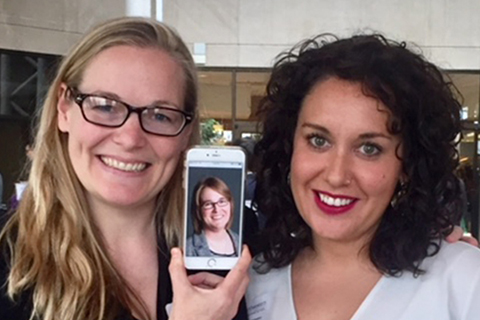Graduate Student Wins Presidential Fellowship

School of Education and Social Policy doctoral candidate Heather McCambly received Northwestern University’s most prestigious award for graduate students, the 2019 Presidential Fellowship.
McCambly, who researches the forces behind educational inequalities in higher education, said winning the highly competitive fellowship was “game-changing” because it will help her complete the fourth and final study of her dissertation using methods rarely applied in the study of educational inequality.
“I’ll have the next two years to be as laser-focused as I can be,” said McCambly, who is pursuing her PhD in human development and social policy. “The grant allows me to look at how powerful actors shape the mechanisms of educational change on a level that is rarely attended to.”
McCambly is the third School of Education and Social Policy student to be named a Presidential Fellow in the last four years. Mollie McQuillan (2017) and the late Cynthia (CC) Dubois (2016) were previous winners. Fewer than 15 percent of nominated students are appointed to the Fellowship, and they are chosen for their outstanding academic and creative efforts and leadership skills.
“Heather represents the best of what our School and doctoral programs offer,” McQuillan said. “She draws from her own experiences working in funding agencies to explore the role financial incentives play in the structural underpinnings of educational inequities.”
A native of Portland, Oregon area, McCambly was raised by her mother and grandmother in a strong multiethnic household and struggled academically in high school. “I never meant to go to college,” she said. But a positive experience at a local community college set in motion a series of events that redefined her life goals.
“In college, I didn’t feel like the assumption was that I needed help or remediation,” McCambly said. “A few key professors even dared to treat me like I was smart.”
After attending Portland Community College, McCambly transferred to Portland State University, where she received the Ronald E. McNair Undergraduate Research grant in 2007, a program designed to help underrepresented students chart a pathway to the PhD, and later the Award of Excellence, the single top award given in a graduating class of 5,000 students.
It was a pivotal moment for McCambly, who said she came to terms with the injustices that had made her path to college and to graduation unlikely. She pressed on, earning her master’s in educational leadership and policy with honors at Portland State and spent the next several years working on access and equity issues in higher education at institutional, state, and national levels.
But while working in Washington D.C. to improve the college experience for students of color on a national scale, McCambly realized that the programs often didn’t stick. When she couldn’t figure out why, she knew it was time to get her doctorate.
At Northwestern, McCambly has shifted her gaze from looking at which programs have the biggest effects on students of color, to exploring how the powerful actors decide what to fund and how that shapes the landscape for racial inequity over time.
“There’s very limited work on the processes that occur before programs even reach the students,” she said. “Most foundations care about racial inequality, but how does that translate into their processes and decisions? I get into both the effects of different racial justice stances and how the organizational processes in the middle translate or resist change.
The deficits projected on students of color really aren’t about them, she says. “They’re about systems of power that shape the lives of students of color and put them under the microscope.”
The Presidential Fellowship is funded by the President of the University and awarded by The Graduate School. McCambly said is looking forward to meeting the other scholarship winners, who are all expected to play an active part in the life of the Society of Fellows—distinguished faculty members and previous Presidential Fellows.
“Some of the greatest optimists and those most committed to social justice in our society have chosen to make their homes in the field of higher education,” McCambly said. “It's a great place to be and a great place to push at the edges of what’s possible.”
Learn more about the Human Development and Social Policy doctoral program, which focuses on factors affecting human development from the prenatal period through adulthood, with an emphasis on understanding the role of context, programs, policies and politics that influence the course of human lives. The School of Education and Social Policy's HDSP program was the first of its kind in the nation.